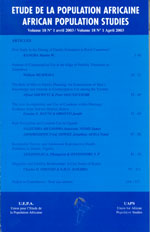
|
African Population Studies
Union for African Population Studies
ISSN: 0850-5780
Vol. 27, No. 2s, 2014, pp. 249-262
|
 Bioline Code: ep13022
Bioline Code: ep13022
Full paper language: English
Document type: Research Article
Document available free of charge
|
|
|
African Population Studies, Vol. 27, No. 2s, 2014, pp. 249-262
| fr |
Obono, Oka & Omoluabi, Elizabeth
Résumé
Le dernier recensement du Nigeria date de 2006 et théoriquement le pays est a trois ans a peine du prochain dénombrement. Nous examinons ici les aspects techniques et politiques du dernier recensement afin de tirer des leçons pour le futur. Notre objectif n'est pas de discuter le résultat lui même, mais plutôt de regarder le processus de préparation aboutissant au dénombrement. Nous décrivons les relations entre taille de popula- tion, allocation des revenues et représentation politique comme moyen de comprendre les dynamiques sociaux et politiques qui peuvent compromettre l'exécution d'un recensement techniquement adéquat. En regardant la logistique, le recrutement du personnel et les procédures de collecte, nous constatons que, comme pour plusieurs recensements précédents, il y avait motivation et opportunités pour la manipulation de celui-ci. Ces paramètres restent encore d'actualité.
Mots Clés
Recensement; interférence politique; ethnicité; aspects techniques; contrôleur
|
| |
| en |
Technical and political aspects of the 2006 Nigerian population and housing Census
Obono, Oka & Omoluabi, Elizabeth
Abstract
Nigeria’s last census was in 2006. If the decennial rule is followed, the country is barely three years away from another headcount. In this paper, we examine the technical and political aspects of that census in order to derive lessons for subsequent censuses. The focus is not on the census results but rather on the processes leading up to and including the actual enumeration. We describe the connections between population size, revenue allocation and political representation as a means of understanding the social and political dynamics that could undermine the execution of a technically adequate census. These connections are examined through reference to logistic, recruitment and enumeration procedures of the 2006 Nigerian Census. We argue that, like most post-independence Censuses before it, there were motivation and opportunities for manipulating the Census figures. These parameters have not changed.
Keywords
Census; political interference; ethnicity; technical aspects; comptroller
|
| |
© Copyright 2014 - African Population Studies
Alternative site location: http://www.uaps-uepa.org
|
|
